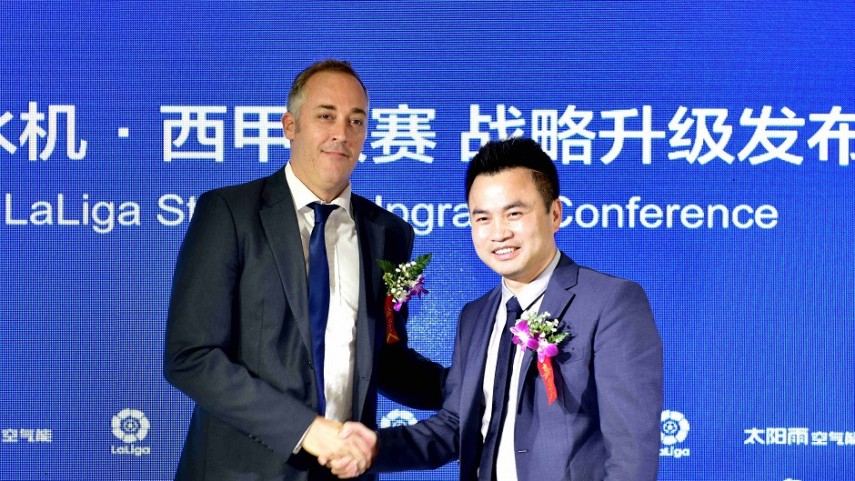Nota de Prensa
JUE 14.07.2016
Whilst Spain’s last 16 defeat to Italy may well have capped the end of an era for the once golden pairing of the national team and Vicente Del Bosque, their domestic football continues to move from strength to strength. Many of the world’s best players are playing in LaLiga. The is backed up by eight of the FIFPro World XI coming from the league, and supported by the fact that Juventus are the sole non-Spanish representative of the last three UEFA Champions League finals. Off the pitch, the league looks set to match its period of on-field prosperity as the new broadcasting rights restructuring seeks to expand LaLiga’s global footprint, reaching new territories and captivating new audiences.
Inevitably, given the huge focus on the growth of football at both a boardroom and grassroots level in China, the Chinese market is of huge interest to the league’s expansion plans. So what are LaLiga’s ambitions for China? And, what initiatives will they be implementing to aid their expansion?
With these questions in mind, our media partners, Yutang Sports, had the opportunity to speak with Sergi Torrents, LaLiga’s country manager for China, to discuss LaLiga’s presence in China, the league’s media partnerships with Chinese broadcasters and why the Chinese market is of particular interest to them.
Having set up an office in Beijing in 2014, LaLiga is set to open their second one in Shanghai this autumn with the aim of expanding their growth in the market. Sergi revealed that LaLiga had changed their strategy to focus on the Asian and Chinese markets which are key to them. "LaLiga have pushed very hard to boost their growth in the Asian and Chinese markets," he said. And he’s right. There are now more LaLiga matches kicking off at prime time (Beijing Time) than ever before, in order to enhance the levels of engagement with Asian and Chinese audiences.
Many might have worried about LaLiga’s media outreach in mainland China, however, had BTV not picked up where LaLiga and CCTV had left off in broadcasting last season. This was a bold move, given that BTV had never previously spent anything on TV rights for sports events. But the success of the free-to-air approach on BTV, instead of CCTV, really proved to LaLiga the attraction of the league in China. According to Sergi, there is only a minor gap between BTV and CCTV in terms of LaLiga viewership despite the fact that CCTV remains the leading TV platform in China. And more importantly, the BTV deal, plus the fixed kick-off time in many LaLiga games, lets the Chinese audience know "where and when to see LaLiga every week".
As a result, live LaLiga games on BTV had higher ratings than live Bundesliga or Serie A games on CCTV when they were aired simultaneously. It demonstrates the strength of LaLiga as an influential European football league, second only to the English Premier League in the Chinese TV market, regardless of TV channels. On the other hand, it is important for LaLiga to choose the licensed broadcaster in such an important market. Speaking of the PPTV deal, Sergi said they were happy about the partnership with PPTV and the wish to "offer a better experience for the audience" partly contributed to LaLiga’s decision to join forces with PPTV. Under the deal, PPTV Sports obtained all the media rights, including digital and new media, of LaLiga in mainland China, Taiwan and Macau from 2015-2020 for €250m.
In a world where digital is playing an increasingly significant role, it is understandable that PPTV has enjoyed the 2015/2016 season as the exclusive digital broadcaster of LaLiga. Spanish top-flight football gained 500m views in the past season, over 60% of which reached the audience live, according to PPTV Sports General Manager, Zhang Xun. A live "El Clasico" between Real Madrid and Barcelona screened on PPTV reaching a record 6 million fans last season. In this regard, LaLiga and its leader in Greater China have paved a sound way for the commercialization of the league’s media rights in the Chinese market.

In addition to the media rights line, Sergi and his team are constantly looking for companies in this territory to partner with in order to activate the benefits of their competition, as part of their sponsorship and licensing businesses. In this sense they can work with local companies and sponsors to help promote brands as well as the value of LaLiga. Moreover, in return, they are here to offer “sports programmes” in order to help promote football in the market.
"When we’re receiving an income in this market, we really want to come back with something tangible for the fans here. So (as) LaLiga is a football competition, what we know about is football. What we can support and add to this market is knowledge about football".
"Essentially, we select the best institutions to work with. We are developing concrete football programmes to not only promote football but also promote the value of the sport, which is crucial for us. Promoting the value of the sport is promoting health, this is the key message we want to leave." Sergi Torrents concluded.
Under the strategy, LaLiga has been running a training program with China’s Ministry of Education for a year, covering kids of different ages in 40 different schools across 10 Chinese cities with 40 Spanish coaches. Additionally, LaLiga is also collaborating with Nike on the “Train the Trainer” program, in which they are training 3,000 Chinese PE teachers. This strategy is undoubtedly part of a long-term vision, and Sergi and his team are trying to introduce more of these kinds of programmes in China, as part of their social responsibilities, to help pave the way for the growth of the sport.
#LaLiga are committed to football development in China.
— LaLiga (@LaLigaEN) February 3, 2016
Full story: https://t.co/45LVCXfZKE pic.twitter.com/LXnDmqzLHw
LaLiga has also been trying to bring more Spanish club football to Chinese fans. Last year, Real Sociedad and Rayo Vallecano both had pre-season tours in Shanghai, impressing not only the Chinese football fans but also investors. Three LaLiga clubs, namely Atletico Madrid, Espanyol and Granada, are all receivers of investment from Chinese businessmen. Sergi believes "Chinese investors are interested in the best (football) assets" and that’s why they are interested in buying into Spanish clubs. Although there is competition for the Chinese market among European football leagues, Sergi shows his belief in LaLiga as "the best sport league" in the world in terms of performance. As a result, LaLiga clubs are seemingly enjoying a close relationship with Chinese investors.
The more Chinese investment there is in LaLiga, the more opportunities the league will potentially have across the country, which will ultimately lead to a Chinese audience more engaged with Spanish football than ever before. Although there is real competition for the audience market among major European leagues, LaLiga, with an effective strategy in place are on their way to an unprecedented level of engagement with Chinese supporters. Given the growing interest of the sport and the massive population in the country, the world’s "best league" is winning the hearts of Chinese fans bit by bit.
© LALIGA - 2016


